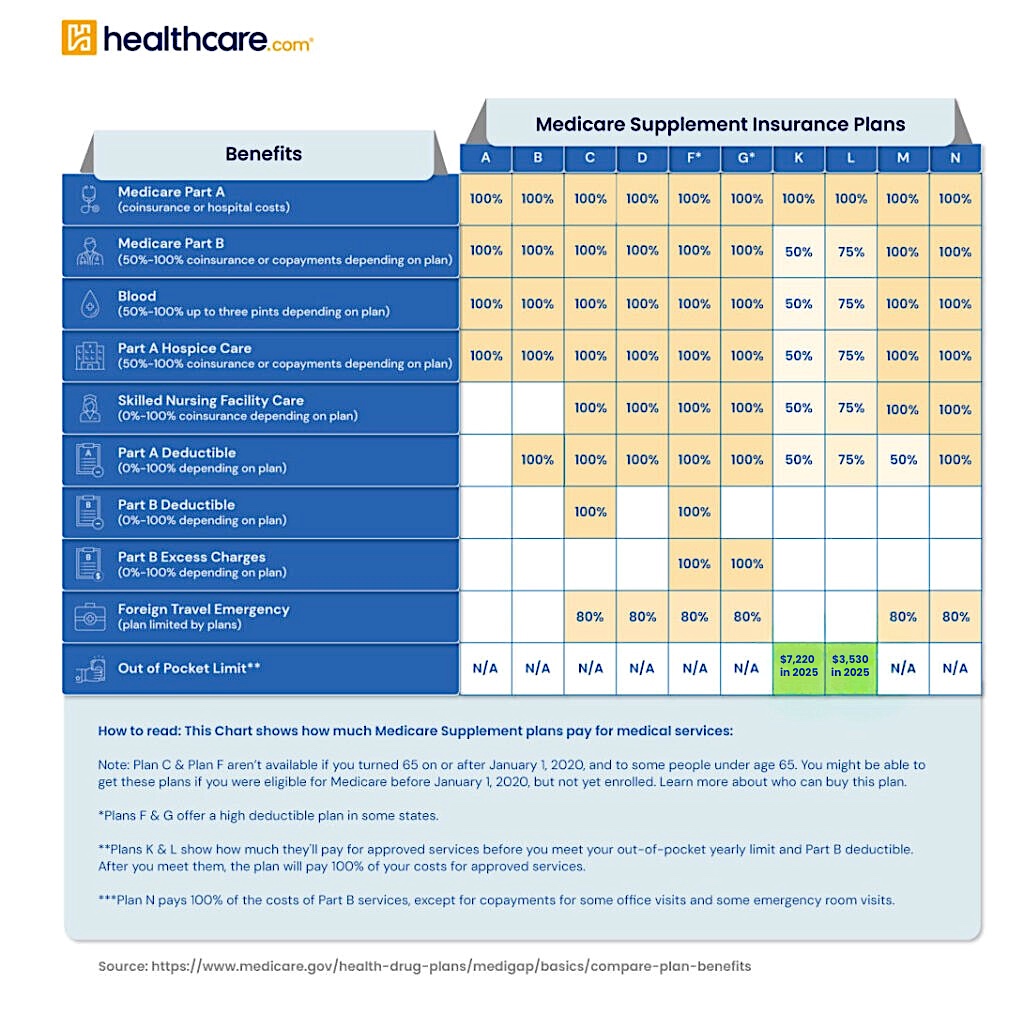Written by Melinda Sineriz
HealthCare Writer
We aim to help you make informed healthcare decisions. While this post may contain links to lead generation forms, this won’t influence our writing. We follow strict editorial standards to give you the most accurate and unbiased information.
What You Need to Know
- Medicare Supplement plans, also known as Medigap, help pay for out-of-pocket costs not covered by Medicare Part A and Part B.
- Delaware insurance companies must accept your Medicare Supplement (Medigap) plan application if you’re in your Medigap Open Enrollment Period or have guaranteed issue rights.
- The three most popular Medigap policies are typically Plans F, G, and N.
What Are Medicare Supplement Plans in Delaware?
Medicare is a federal health insurance program for individuals aged 65 and older, as well as younger people with qualifying disabilities or health conditions (e.g., end-stage renal disease).
Original Medicare includes Part A (Hospital Insurance) and Part B (Medical Insurance). While it covers many healthcare services, it still leaves you responsible for deductibles, coinsurance, and copayments. Medicare Supplement plans help pay for these additional costs.
Medigap plans are standardized by letter (A through N). That means Plan A from one company provides the same benefits as Plan A from another, although premiums and customer service may vary.
Learn how these plans work and how they can benefit Delaware residents.
Compare options HERE & start your health plan journey.
When Can You Enroll in a Medicare Supplement (Medigap) Policy?
You can apply for a Medigap plan at any time. However, outside of your Medigap Open Enrollment Period—or without guaranteed issue rights—insurance companies may use your health history to deny coverage or charge higher premiums.
Your Medigap Open Enrollment Period lasts for six months. It begins the month you’re both age 65 (or older) and enrolled in Medicare Part B. During this window, insurers must offer you any plan they sell at standard rates, regardless of your health.
Guaranteed issue rights arise from specific situations, such as losing other health coverage or moving out of a plan’s service area. If you qualify, insurers must sell you a policy and cannot charge more due to your health status.
Birthday Rule: Effective 1/1/2026, individuals may switch to a Medicare supplement plan with similar or lesser coverage from any carrier without medical underwriting. The guaranteed issue window runs from 30 days before through 30 days after their birthday.
Annual Rule: Also effective 1/1/2026, individuals in Medicare Advantage may cancel their plan during Open Enrollment and enroll in a Medicare supplement plan.
What Are the Most Popular Medicare Supplement Plans?
Across Delaware and the nation, the most commonly selected Medigap plans are:
- Plan F: Offers the most comprehensive coverage, but is only available to individuals who became eligible for Medicare before January 1, 2020.
- Plan G: Covers nearly everything Plan F does, except the Medicare Part B deductible.
- Plan N: Covers many essential costs but has copayments for doctor visits and ER visits. It does not cover Part B excess charges.
Each of these plans is standardized, meaning their benefits are the same across insurers. However, plan availability and pricing may differ.
How Do You Choose a Medicare Supplement Plan?
Choosing the right Medigap plan involves:
- Assessing your healthcare needs: Consider how frequently you visit providers and what kind of services you use.
- Comparing plan letters: Decide whether you prefer more comprehensive coverage (like Plan G) or lower premiums with some cost-sharing (like Plan N).
- Researching insurers: Not all companies offer all Medigap plans. Compare providers for plan availability, customer satisfaction, and premium pricing.
The benefits of each lettered plan are the same, so focus on finding a trustworthy insurer with competitive rates and good service.
How Much Do Medigap Policies Cost?
Medigap premiums in Delaware vary based on several factors:
- Age and gender
- Tobacco use
- The plan you select
- The insurer’s pricing method (attained-age, issue-age, or community-rated)
Even though benefits are standardized, prices for the same plan can vary widely between insurance companies. Always compare “like with like”—for example, Plan G with one company vs. Plan G with another.

What If You Want to Change Your Medicare Supplement Plan?
You can apply to change your Medigap policy at any time. However, unless you qualify for guaranteed issue rights, you may be subject to medical underwriting. This means insurers could deny coverage or charge more based on your health.
To avoid this, it’s best to select the right plan during your initial Medigap Open Enrollment Period.
Compare options HERE & start your health plan journey.
What Are Alternatives to Medicare Supplement Plan?
Medicare Advantage plans, also known as Part C, are an alternative to Medigap. These plans are offered by private insurance companies and include Part A and Part B. Most plans also include prescription drug coverage (Part D) and may offer additional benefits like:
- Dental
- Vision
- Hearing
- Wellness programs
Unlike Medigap, Medicare Advantage plans typically require you to use in-network providers. Still, they can be a convenient all-in-one solution for many beneficiaries.
Learn more about Delaware Medicare Advantage plans.
Medicare Part D?
Medicare Part D plans provide standalone prescription drug coverage.
- Who needs it: Beneficiaries with Original Medicare who want drug coverage.
- What it covers: Prescription medications. Coverage varies by plan.
- How it’s offered: Through Medicare-approved private insurers.
- Not needed if: You’re enrolled in a Medicare Advantage plan that includes drug coverage (MAPD).
Shop for a Medicare plan with additional benefits!
Do Medigap Plans Cover Prescription Drugs?
No. Medigap plans do not include prescription drug coverage. If you want drug benefits, you’ll need to enroll in a separate Medicare Part D plan.
Medicare Resources in Delaware
Residents of Delaware can access several resources for help with Medicare and Medigap:
- Delaware Medicare Assistance Bureau (DMAB): The state’s SHIP program provides free, personalized Medicare counseling.
- Delaware Department of Insurance: Offers regulatory oversight and handles consumer complaints.
- Delaware Medicaid: Provides healthcare coverage for qualifying low-income residents and may work with Medicare benefits.
Next Steps
If a Medicare Supplement plan in Delaware seems right for your needs, the next step is to compare available options. You can research plans online or consult a licensed insurance agent for expert, personalized assistance.
Make sure to also explore Medicare Part D or Medicare Advantage plans, depending on how you prefer to manage your healthcare and prescription needs.
Thank you for your feedback!
U.S. Government Website for Medicare. “Choosing a Medigap Policy: A Guide to Health Insurance for People with Medicare.” medicare.gov (accessed February 8, 2021), 9, 13.
“Choosing a Medigap Policy: A Guide to Health Insurance for People with Medicare.” 14-16.
“Choosing a Medigap Policy: A Guide to Health Insurance for People with Medicare.” 21-23.
Bocutti, Cristina, Gretchen Jacobson, Kendal Orgera and Tricia Neuman. “Medigap Enrollment and Consumer Protections Vary Across States.” kff.org (accessed February 8, 2021).
“Choosing a Medigap Policy: A Guide to Health Insurance for People with Medicare.” 10.
America’s Health Insurance Plans. “State of Medigap: Trends in Enrollment and Demographics.” ahip.org (accessed February 8, 2021), 7.
“Choosing a Medigap Policy: A Guide to Health Insurance for People with Medicare.” 11.
Department of Human Services. “Medigap Plan Benefits.” nj.gov (accessed February 8, 2021).
“Choosing a Medigap Policy: A Guide to Health Insurance for People with Medicare.” 19.
“Choosing a Medigap Policy: A Guide to Health Insurance for People with Medicare.” 17-18.
“Choosing a Medigap Policy: A Guide to Health Insurance for People with Medicare.” 16.
U.S. Government Website for Medicare. “Medicare Advantage Plans.” medicare.gov (accessed February 8, 2021).







